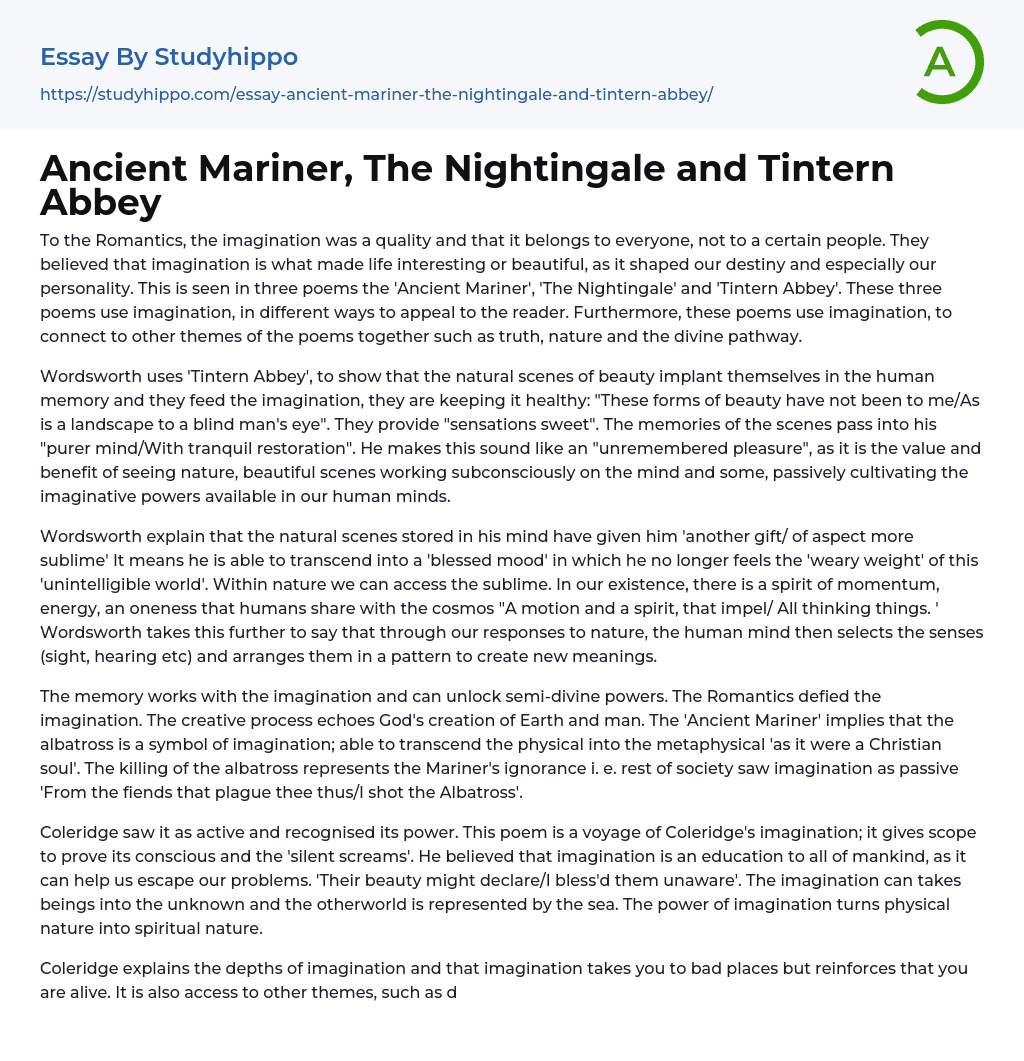

Ancient Mariner, The Nightingale and Tintern Abbey Essay Example
To the Romantics, the imagination was a quality that belonged to everyone, regardless of their background. They believed that imagination was what brought beauty and interest to life, shaping our destiny and personality. This belief is evident in three poems: 'Ancient Mariner', 'The Nightingale', and 'Tintern Abbey'. Each of these poems employs imagination in unique ways to captivate the reader. Moreover, the use of imagination in these poems helps to intertwine other themes such as truth, nature, and spirituality.
In 'Tintern Abbey', Wordsworth illustrates that beautiful natural scenes have a lasting impact on the human memory and contribute to nourishing the imagination. These scenes are crucial to maintaining its vitality: "These forms of beauty have not been to me/As is a landscape to a blind man's eye". They evoke "sensations sweet". The memories of these scenes deeply penetrate his "purer
...mind/With tranquil restoration". He portrays this as an "unremembered pleasure", underscoring the significance and advantage of observing nature and how it silently nurtures the creative capacities inherent in our minds.
Wordsworth conveys how the natural scenes etched in his memory have granted him a greatly enhanced viewpoint. This enables him to ascend into a realm of serene peace, where he is no longer troubled by worldly complexities. Nature possesses the power to connect us more deeply with the sublime. Our lives encapsulate a spirit of dynamism, vigor, and harmony with the cosmos. A motivating energy exists that fuels all thinking beings. Wordsworth further posits that our engagement with nature stimulates our senses (like vision and auditory perception) and arranges them in such a way as to produce fresh understanding and significance.
The memory and imagination are connected
and can unleash powerful abilities. The Romantics challenged the imagination. The process of creating is comparable to God's creation of Earth and humans. In the poem "The Ancient Mariner," the albatross symbolizes imagination, capable of transcending the physical world into the metaphysical realm, likened to a Christian soul. The Mariner's killing of the albatross signifies his lack of understanding, while society views imagination as something passive, as expressed in the line "From the fiends that plague thee thus/I shot the Albatross."
According to Coleridge, he viewed imagination as active and powerful. This poem is a journey into Coleridge's imaginative mind, showcasing its consciousness and its ability to convey profound emotions. Coleridge believed that imagination serves as a form of education for all of humanity, offering an opportunity to escape from our troubles. He states, 'Their beauty might declare/I bless'd them unaware', indicating that imagination has the potential to reveal hidden truths. The poem also portrays the sea as a representation of the unknown and the realm beyond our world. Ultimately, the power of imagination has the ability to transform the physical world into something spiritual.
Coleridge discusses the profound nature of imagination, stating that it can lead to unsettling places yet also serves as a reminder of our vitality. Furthermore, it allows us to explore various themes including death and Life-in-death. In the poem 'Nightingale,' the nightingale symbolizes imagination and represents our connection to the divine pathway of nature, which it enlivens. Imagination plays a crucial role in shaping our personal truth. As humans, we possess an active imagination that is influenced by our emotions, mood, and interactions with the natural world.
The supernatural: "(Even like a Lady
vow'd and dedicate To something more than nature in the grove)' signifies the ability of the imagination to establish a connection with the realm beyond and the profound enigmas of life and being. It also embodies the mystical priestess of Druidic lore, which is inherently imaginative as portrayed in myths. Humanity becomes immersed in the realm of imagination, where pleasure and beauty are accessed, and Coleridge elevates the creative force to a divine level. Imagination possesses the capability to mold both the conscious and subconscious aspects of our existence; it is through this faculty that we find resolution to our own sorrows.
The term 'Philomela' refers to the Greek myth which signifies humanity's transformation into bird-like beings capable of accessing the sublime and imagination, akin to the Greek Princess Philomela. In general, the Romantics considered the imagination not as a passive entity, but as closely connected to God. They believed that comprehending the imagination would enable us to comprehend everything in our surroundings. Without the imagination, they implied that none of our problems would have been solved. Moreover, they held the notion that the imagination served as a unifying force for humanity, both consciously and unconsciously.
- Cosmetics essays
- Skin care essays
- Makeup essays
- Age Of Enlightenment essays
- Ethos essays
- Time essays
- Acceptance essays
- Meaning Of Life essays
- Reality essays
- Natural Law essays
- Political Philosophy essays
- Utilitarianism essays
- Existence essays
- Free Will essays
- Good And Evil essays
- Confucianism essays
- Relativism essays
- Conscience essays
- Environmentalism essays
- Empiricism essays
- Epistemology essays
- Ethics essays
- Existentialism essays
- Human Nature essays
- Individualism essays
- Metaphysics essays
- Philosophy Of Life essays
- Transcendentalism essays
- Truth essays
- Destiny essays
- Determinism essays
- Fate essays
- Functionalism essays
- Philosophers essays
- Pragmatism essays
- Future essays
- Child Observation essays
- Critical Reflection essays
- Teaching Philosophy essays
- Personal Philosophy essays
- Action Speak Louder Than Words essays
- Can Money Buy Happiness essays
- Values of Life essays
- Ethical dilemma essays
- Normative Ethics essays
- Virtue Ethics essays
- Belief essays
- Deontology essays
- Moral essays
- Virtue essays



